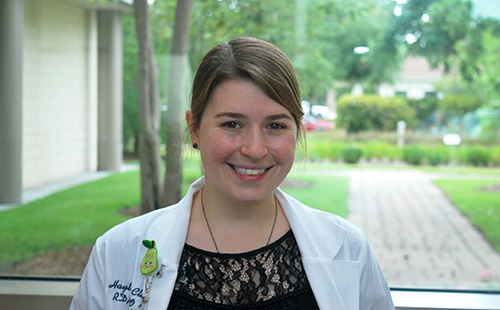Food for thought: What should I eat during cancer treatment?
Cancer, Nutrition
LCRP registered dietitian cuts through the myths about eating while fighting cancer
For many cancer patients, treatment can include a variety of modalities. Surgery, chemotherapy and radiation therapy may be among the first that come to mind.
However, there are lifestyle factors that also can help you get better sooner including diet and exercise.
“Food is often the first form of medicine because we know what we eat and the way we eat can influence our susceptibility to cancer,” says Hayley Cleaver, outpatient oncology dietitian at the Nancy N. and J.C. Lewis Cancer & Research Pavilion. “During treatment it’s really important to maintain your weight and you can do that through diet.”

Related Article: Should I exercise during cancer treatment?
But there’s a lot of misinformation out there when it comes to what to eat and what not to eat during cancer treatment. At the Lewis Cancer & Research Pavilion, we have three dedicated registered dietitians (two in Savannah and one in Bluffton/Hilton Head) to help navigate your nutrition during treatment.
It starts with maintaining your current body weight
One of the most important things you can work towards during cancer treatment is maintaining your weight. We know that sounds hard if you experience vomiting, diarrhea or loss of appetite; however, maintaining your weight can help prevent changes or breaks in treatment, meaning you get better quicker.
In fact, studies show that people who maintain their weight often end up with the best outcomes for treatment, Cleaver says.
Take for example radiation therapy patients. Their treatment plan is based on their body composition. If they lose weight or in some cases gain weight that shifts body composition and may force a break in treatment to develop a new plan.
“The main goal is to get through treatment without any breaks, without any changes to radiation therapy or medications, anything like that,” Cleaver says.
There are some exceptions to this, depending on your cancer and treatment regimen. Be sure to talk to your physician and dietitian about weight goals during treatment.
Tailor your diet based on symptoms and type of treatment
Symptoms of cancer treatment can often have an effect on your diet. Some common side effects can include nausea, taste changes, fatigue, diarrhea and loss of appetite.
“Very few patients experience just one side effect,” Cleaver says. “Commonly, patients experience a combination of symptoms, which has a great impact on one’s appetite.”
“At the same time, you can have a patient who experiences no symptoms. Every person reacts differently.”
Because of that, the LCRP offers dietitian services to cancer patients free of charge to help patients navigate changes in appetite during cancer treatment.
All chemotherapy patients and palliative care patients treated at the LCRP are screened regularly throughout their treatment. High-risk radiation therapy patients, such as those with head and neck cancer, GI cancer or pancreatic cancer – are also screened by a dietitian. Those with other cancers may see a dietitian with a referral, but again all meetings are free.
Dietary screening of chemotherapy patients includes screening on the first day of treatment and periodically throughout treatment cycles. The screening tracks weight changes and symptoms and scores patients based on a series of questions. A score of 4 or higher puts them at risk for malnutrition.
“It’s important to say, ‘Right now, you’re having symptoms A, B and C,’ and here’s how we get calories in you,” Cleaver says. “A dietitian can help patients by educating them on what to eat based on their symptoms and giving them some examples of what to do as well.”
General tips to follow
You may find some or all of the following tips helpful during your cancer treatment:
- Eat small, frequent meals
- Stay hydrated with water and electrolyte beverages
- Consider calorie-dense beverages to help replace lost nutrients; there are many out there so ask your dietitian to help find the best one for you
- Practice safe food handling
- Be wary of taking supplements; they may or may not have a direct or indirect effect on your medication
Final tip: Don’t feel guilty about your diet
Your goal during cancer treatment should be to get better.
Don’t feel guilty if you don’t eat a lot of fruits and vegetables because the fiber makes you sick. If your calories come from milkshakes, that’s OK. Consider adding some peanut butter to apple slices or cheese in scrambled eggs to increase the calories.
“A lot of people look at every little aspect of their diet and end up with really restrictive diets,” Cleaver says. “In those cases, I like to liberalize their thoughts and educate them. There’s no bad food. Just be sure to consume everything in moderation.”
If you are a cancer patient at the LCRP and would like to talk to one of our registered dietitians, talk to your physician about a referral today.
You may also want to read:
- Cancer Mythconception: Side effects dissipate when treatment is over – part 1
- Cancer Mythconception: Side effects dissipate when treatment is over – part 2